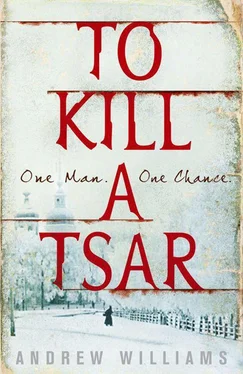‘A traitor? My loyalty is to the people and to my real comrades,’ he said quietly.
Only the collegiate councillor’s strictures to avoid unnecessary violence held Barclay’s hand. Oh, how dearly I want to see this creature brought down, he thought. I want to grind my boot in his face. ‘Get him out of here,’ he barked.
‘Where to?’ Agent Marusin inquired.
‘Fontanka 16, of course.’ Barclay’s eyes were fixed on Kletochnikov’s long white face. ‘Everyone is anxious to meet the Director. But keep your hands off him — for now.’
Dobrshinsky tired of asking questions and receiving no answer and moved Mikhailov to the Peter and Paul. It was the nineteenth of November. Mikhailov did not know the date until he arrived beneath its white arch: a year to the day since the attack on the tsar’s train. Inside the curtain wall the low scaffold where Kviatkovsky was executed for his part in the plot was thick with snow, ropes still hanging from the beam. Beyond Peter’s cathedral, the grim face of the fortress proper and the gate to the prison. They led him in chains between a row of soldiers into a guardhouse, and from there across a small courtyard to the ravelin in the outer wall.
Rags for binding his legs, a filthy grey and brown smock, peasant shoes and an unlined sheepskin coat saturated with the stale sweat of many.
The penance cell was lit by a shaft of light from a small barred window high in the wall, the stone floor covered in rubbish and fetid straw, the only furniture a narrow plank bed with a wafer thin mattress and a toilet bucket.
An old soldier from the time of Tsar Nicholas was posted at his door, pledged to guard him at all hours. The gendarmes called him ‘Uncle Vishka’, a filthy white-haired rat of a man who, after two decades within the ravelin’s walls, was sick and bitter and malignant. His bloodshot eye hovered at the spy hole in the door for hours and he spoke only abuse to the prisoners. He would thrust his grubby hands through a window like a wicket in the iron door twice a day with a glass of tea, dry bread or a little weak soup that tasted of nothing and was often tainted by the guards.
The stench in the cell was overpowering, and Mikhailov’s hair and beard were soon crawling with lice. But it was the oppressive silence that troubled him most. Once he heard screaming from the corridor and hammered on the door until Uncle Vishka spoke to him: ‘They’re thrashing some money out of a newcomer.’
‘What?’
‘Everyone has to pay,’ the old soldier said carelessly. ‘You gentlemen politicals get off lightly.’
His escape was to the past, conversations, people, whirling Anna about the dancefloor — he thought of her often — and summers on his father’s estate. He took an unholy delight too in imagining the death of the tyrant, the revolution, a popular uprising that would set the prisoners free. But hope was inseparable from fear. There were times in the winter chill at night when he knew despair and he would pray to the Russian god he did not believe in for a quick release.
At first, he had been flattered by the attention of the authorities, the procession of visitors to his cell at the Preliminary — senior policemen and soldiers, government ministers — who had learned of his importance to the party from the testimony of Goldenberg. Collegiate Counsellor Dobrshinsky had spent many hours trying to break him with threats and promises and even the offer of a pardon if he turned state evidence. He had expected and enjoyed resisting these blandishments. But he had been surprised and irritated by the particular interest the special investigator had shown in the English doctor. Why had the party tried to kill him? Was he a member of The People’s Will? What help were they receiving from the British? Money? Explosives? Mikhailov had refused to answer all but the last of these, for he was a socialist patriot and would never have accepted assistance from a foreign power. What a trouble the Englishman had been to him. Would he have stepped inside the photographer’s shop if Anna had not charged him so vehemently with acting only in his own interests?
By a wicked irony it was the doctor who brought him some relief from the cell and the ravelin at Christmas. It was late afternoon, to judge from the grey rectangle of sky, and in the corridor the confused echo of boots and a jangle of keys. The iron door opened and the warder stepped inside, his nose pinched between thumb and forefinger: ‘You stink like a Tatar. What’s your visitor going to think?’
For the five minutes it took to walk under escort to the Commandant’s House he felt drunk with the hope his mother or sister was waiting to see him, or a comrade in disguise. The crunch of boots in the snow, the tolling of a barracks bell, a troika sliding towards the Peter Gate, clean air sharp in his chest, the sights, sounds, taste of the life he used to live.
But it was Major Vladimir Barclay who was warming his hands at the stove. With a weak smile and a casual wave, he indicated that Mikhailov should take a chair. For once, the major was in the blue and red of the corps, campaign medals on his broad chest and the Order of St Vladimir at his throat. To Mikhailov’s mind he did not cut an impressive figure, rather foreign with his round beardless face, crafty eyes and thin brown hair.
‘You look awful,’ the policeman observed coolly. ‘I’ll speak to the warder. A bath and a shave. After all, you are a gentleman, aren’t you? Tea?’
Mikhailov nodded.
‘But you’ve lost a little weight; that’s a good thing.’
The tea tasted as it should taste and Mikhailov sat at the table with a glass cupped in his hands, grateful for that small kindness. It was a warm panelled room with an eighteenth-century chandelier, fine walnut chairs and a stove of pretty blue and white Dutch tiles. It made Mikhailov feel dirtier and even a little ashamed, and that made him irritable.
‘Well, what do you want?’
‘Collegiate Counsellor Dobrshinsky has asked me to speak to you again,’ said Barclay. ‘The ravelin is no place for a gentleman. He said to me: “See if Alexander Dmitrievich is ready to help us a little, now he’s had time to reflect upon his future”.’
Mikhailov watched impassively as the policeman leant across the table and poured more tea into his glass.
‘We know your little comrades are plotting another attempt on the emperor’s life.’
‘Oh?’
‘You people can’t take a shit without us knowing about it.’
Mikhailov looked at him disdainfully. ‘Then I can’t possibly be of service to you.’
‘But you can.’ The policeman leant forward again, his big hands clasped together, warm smile, eyebrows arched. ‘How? When? Where?’
‘I really have nothing to say.’ Mikhailov wondered that the special investigator had trusted this task to a man with the intellect of a common soldier.
‘A porter has reported seeing your comrade Anna Kovalenko again.’
‘Oh?’
‘Yes, she was visiting the Englishman at the Nikolaevsky,’ said Barclay, with a knowing voice.
Mikhailov felt the colour rising in his face. The policeman had swung wildly and caught him a glancing blow. He was not going to show it. Placing his palms flat on the table, he almost shut his eyes, as inscrutable as a plaster saint.
‘If your comrades kill the emperor another will take his place, but if you don’t help us you will die in a damp hole forgotten by everyone.’
‘Right-minded people must give themselves to this struggle.’
‘The gentleman peasant,’ said Barclay with a cynical smile. ‘Collegiate Counsellor Dobrshinsky was sure you wouldn’t listen to reason. That’s why he sent me, of course.’ He sat up slowly, dragging his fists back across the table then rising to his feet.
Читать дальше












